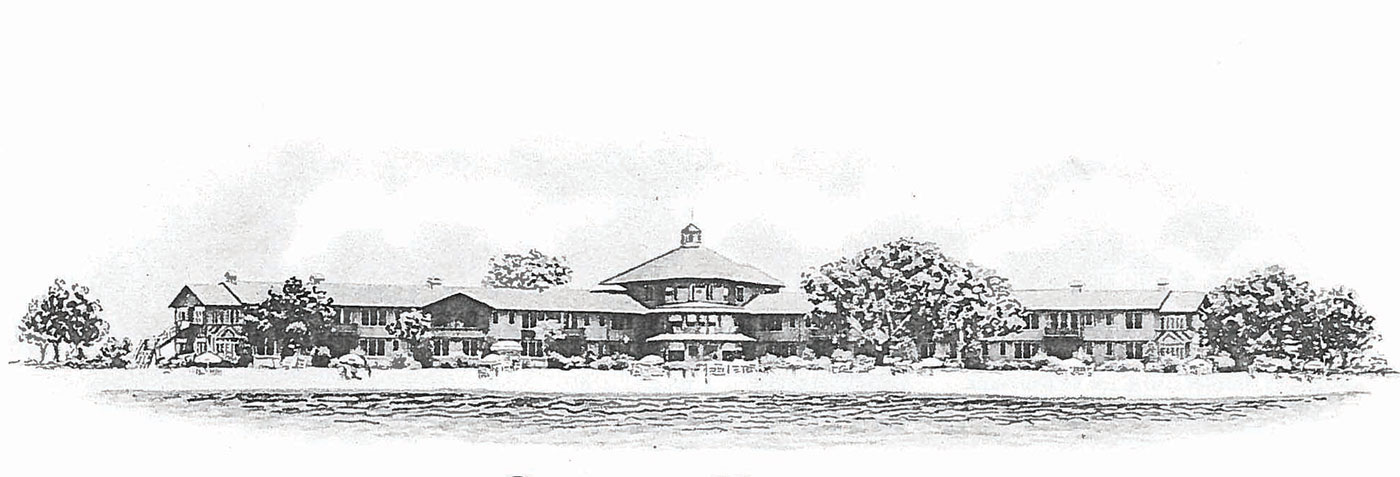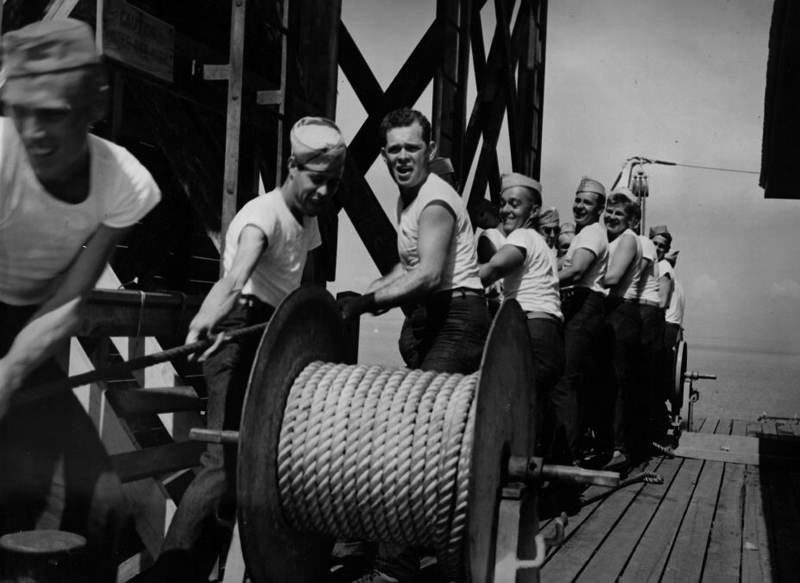
Suite 1108 at the Grand Hotel isn’t your typical hotel room. Situated at the far end of the east wing, the corner suite provides a snapshot of Point Clear at its finest: a timeless live oak at the window, a stretch of trimmed grass and the lapping waters of Mobile Bay. But it’s not the scenery that sets this particular room apart. Rather, it’s the story of one of its guests, who occupied the room for five months in 1944, that makes this room special. For it was from this very suite that Lt. Col. Matthew Thompson ran a secret military operation that played a vital part in World War II’s final push. They called it Operation Ivory Soap.
As Allied forces fought their way through the Pacific toward Japan, they employed a tactic called “island hopping.” The idea was to capture Japanese-held islands of strategic importance while skipping, or “hopping, ” ineffectual islands and leaving them to “wither on the vine.”
This tactic had many advantages. It allowed the Allies to move through the Pacific quickly, it prevented them from wasting supplies and manpower on capturing inconsequential territory and it provided them with the all-important element of surprise. By taking over an island and its airfields, the Allies could extend their air superiority throughout the Pacific on their long march to Japan.
As the island hopping campaign progressed, it presented a problem that needed to be resolved — and quickly. American bombers and fighter planes returning from long-range missions needed to be repaired and rearmed for the next mission, but building repair facilities on each island was taking too much time.
Gen. Henry H. “Hap” Arnold, commander of the Army Air Forces, recognized the need for floating repair facilities and determined that six Liberty ships could be modified into Aircraft Repair Units carrying 344 men and 18 smaller vessels turned into Aircraft Maintenance Units carrying 48 men.
The ships took just six months to modify and were designed to carry everything from the smallest aircraft parts to entire wings. These floating mechanic shops would fix it all: radars, tires, carburetors, batteries, sheet metal, parachutes, everything. If you could break it, they could fix it.
But who would man these ships? Mechanics from the Army and Air Force were the obvious choice, but such men had never been trained to live and operate at sea. Enter the Grand Hotel in Point Clear, Alabama.

A Floating Idea
The task of training these men fell to Lt. Col. Matthew Thompson of the Army Air Force and former member of the British Royal Navy. Thompson was given just two weeks to organize the training program, and the first step was to find a suitable location. When he heard rumblings that the Grand Hotel, a historic waterfront establishment, would be closing, Thompson was intrigued. He was put in touch with Ed Roberts, head of the Waterman Steamship Co., which owned the Grand Hotel.
Years later, in an interview with The Times-Picayune in New Orleans, a 91-year-old Thompson described that meeting, which took place in what is now the hotel’s Bucky’s Birdcage Lounge. Roberts offered to allow the troops to use his hotel for free, taking Thompson by surprise.
“Colonel, I’m too old to fight, ” Roberts told Thompson, “and this is my donation to the war effort.” A gentleman, Thompson told the owner that using the hotel free of charge just didn’t feel right.
“So he said, ‘Give me a dollar, ’” Thompson remembers. “I gave him a dollar, and that was that.”
In the wake of the meeting, the following contract was drawn up: “It is hereby agreed between Ed Roberts and Lieutenant Colonel Matthew Thompson, representing the United States Government, to lease said premises of the Grand Hotel to the Army Air Corps for the sum of $1 per year for the duration of the war.”
With the location decided, the operation needed a name. “We called this the Ivory Soap Project, ” Thompson later told The Times-Picayune. “Now how did this become that code name? Someone went to the restroom, and when he came back, said, ‘I’ve got a name for the mission: Ivory Soap.” Ivory soap, like the experimental Aircraft Repair Units the military wanted to deploy, floats. The name stuck. On July 10, 1944, Operation Ivory Soap was officially under way.

Bootless Camp
Practically overnight, the Grand Hotel was transformed to mimic nautical conditions, and men were made to live in “Navy style.” For example, all personnel were required to refer to the hotel’s floors as decks. Time was kept using a ship’s bell, and men were only allowed to use tobacco when the “smoking lamp” was lit. Out of respect for Roberts and his generous donation, soldiers refrained from wearing combat boots inside the hotel to protect its beautiful hardwood floors.
“We had to strip the hotel, ” Thompson remembered. “The troops ate in the dining room, a mess hall then. I had a 40-foot tower built for them to jump [from] so they could learn to abandon ship. There was a lifeboat right out there, with oars … Men from the Naval Air Station in Pensacola would fly over and scare the living hell out of the men here.”
The troops were subjected to many courses and exercises, including swimming, knot-tying, marching, navigation, ship identification, amphibious operations, cargo handling and much more. Two men from each ship were trained as underwater divers.
Though Operation Ivory Soap was designated a secret operation, local residents could, and often would, watch the men go about their training in Alabama’s summer heat, which closely resembled the climate of the Pacific. Soldiers paddled lifeboats furiously in Mobile Bay, simulating the aftermath of a shipwreck. Amphibious vehicles stormed the beaches of Point Clear. Troops stood in formation on the green grass in preparation for the day’s training. Instructors stood beneath wisps of Spanish moss, using charts to teach the men the different parts of a ship. Lectures were often given outside in search of a cool Point Clear breeze.
The hotel’s transformation was both impressive and effective: In just five months, 5, 000 men were trained at the Grand Hotel and sent into the Pacific Theater. When the boys finally went into war, their commander, Lt. Col. Thompson, joined them. The men of Operation Ivory Soap would go on to participate in the Allied landings at Guam, Iwo Jima, Okinawa, the Philippines, Saipan and Tinian. According to the U.S. Congressional Record, “Hundreds of B-29 and P-51 fighters returned to battle to fight again because of these deport and maintenance ships.”

A Grand Legacy
Though officially declassified in 1953, Operation Ivory Soap lingered in obscurity for half a century before the public, and even some of the operation’s participants, understood its scope. In an address to the U.S. House of Representatives in 1998, Congressman Tony P. Hall stood to honor the brave men of Operation Ivory Soap, saying, “This is another one of the never-told stories out of the dust vaults of declassified secret records. This story was uncovered by one of the ship’s crew seeking his comrades for a reunion. Only in the last few years have these documents been released to the public.”
The year before Hall’s address, the Grand Hotel made a gesture of its own to honor the men of Ivory Soap. In celebration of the hotel’s 150th anniversary, room 1108 was officially renamed the Thompson Suite in honor of the commander whose office occupied that very room. Having retired in Pensacola, Thompson was known to frequent the Grand Hotel in his later years and refused to stay in any other room besides 1108. Thompson passed away in 2005 at the age of 99.
Every day at 3:45 p.m., the Grand Hotel honors its wartime history with a procession across the grounds, concluding with a brief history lesson and cannon firing on the edge of Mobile Bay. May it ever be a reminder of the resourcefulness and tenacity of those involved with Operation Ivory Soap and the generosity of individuals such as Ed Roberts in the midst of war.
On the floor of the U.S. Senate in 2000, Sen. Jeff Sessions honored the veterans of Ivory Soap, concluding, “Perhaps the greatest tribute I can make to the exploits of these sea-going airmen is to paraphrase the Merchant Marines who worked with them and who praised them as ‘equal to any seagoing combatants they had ever served with.’”
Mobilians Remember Pearl Harbor
William G. Caffey, a Mobilian stationed in Hawaii, wrote the following letter home to his family on December 9, 1941, two days after the Japanese attack on Pearl Harbor. Caffey passed away in 2000 at the age of 81:
Dear Folks,
Just a line which I hope will go out by clipper — can’t send any cables or wires. I’m OK — so don’t worry. We had quite an attack Sunday but few here at [Fort] Kam[ehameha] were injured — everything has settled down now. As this will be censored anyway, I won’t say more — but don’t worry — and I’ll try to let you hear from me as often as possible.
Love, Will G.
Dr. Sidney C. Phillips, a Mobilian who served in the Pacific, in a 2013 interview with the National World War II Museum:
I was sitting in a drugstore at the corner of Dauphin and Ann streets drinking a vanilla milkshake with my good friend W.O. Brown … A lady burst in the side door and screamed, “Turn on the radio!” He [W.O.] had a radio there on the soda fountain … and he turned it on, and they were talking about Pearl Harbor on every station … Nobody knew where Pearl Harbor was except me. I was able to show off and tell everyone, “That’s in Hawaii.” Because I had two uncles in the Navy … The news I remember was very sketchy. It did not tell what ships had been hit; it did not tell the extent of damage. Somewhere in his spiel, he said there are thousands of casualties, and I remember some women started crying when he said that. My friend W.O. … said, “Sidney, let’s go join the Navy tomorrow.” And I said, “OK.” And that was my response to the attack on Pearl Harbor.
The two friends met at Bienville Square the next day before enlisting in the Marines. Phillips passed away in 2015 at the age of 91.
Mrs. Emma Buck St. John was a student at The University of Alabama when she heard the news:
I was in the Kappa Delta house … and there were some seniors in the living room talking, and they were so upset that Pearl Harbor had been bombed. Us younger ones had never heard of Pearl Harbor, and I thought they were just putting us on and pretending to make something big out of it. But we learned soon enough.





